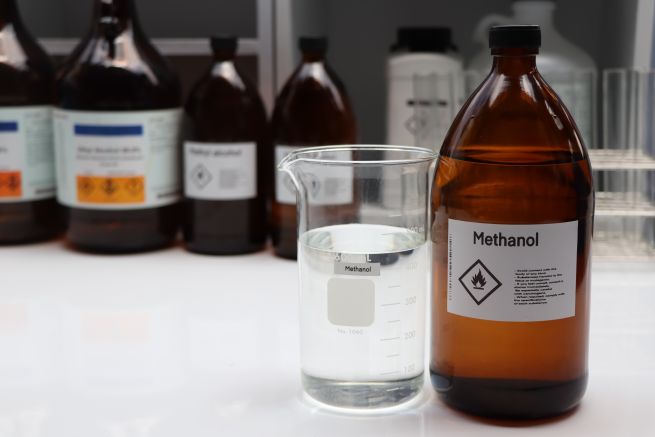Tests on the compatibility of fuel, materials and engine oils
29 Oktober 2024 – Regenerative methanol is currently being considered as a promising fuel for the CO2 neutral operation of engines. OWI Science for Fuels gGmbH is currently conducting in-depth tests on compatibility of methanol with materials and engine oils in a current research project for the Forschungsvereinigung für Energiewandlungssysteme FVV e.V. (Research Association for Energy Conversion Systems). The results are of particular interest for applications in large marine engines. Methanol is also seen to be an option for automotive transport, where either electrification is not feasible or the electric charging infrastructure is not sufficiently available.

OWI Science for Fuels gGmbH is currently conducting in-depth tests on compatibility of methanol with materials and engine oils in a current research project. Photo: kittisak – Adobe Stock
Due to the significantly differing physico-chemical properties (from mineral oil-based fuels), further studies specific to engine applications are required in addition to those already previously available. The above-mentioned investigations would provide definite indicators for the further development and selection of materials for fuel-carrying engine components and engine oils when using methanol. These involve questions such as whether the composition of the exhaust gases from the combustion of methanol would affect the materials of the engine, and additionally how methanol and various types of engine oils behave in contact with each other. There is also a need for deeper understanding of the corrosion behaviour of the interacting metallic components and the lubricity of methanol during engine operation. These are important as increased corrosion and wear can have a significant impact on the service life of metallic engine components.
OWI Science for Fuels uses various methods for the above mentioned investigations: for example, pre-defined mixtures of methanol and engine oil are prepared and analysed in tests to characterize interaction between the two compounds. Long-term effects such as fuel ageing are investigated using a forced ageing test in a specially constructed test rig. During this test, parameters such as temperatures and pressure can be varied to influence the ageing process. Storage tests are also conducted where specifically chosen materials -commonly used in engine construction are exposed both to exhaust gas atmospheres from methanol combustion and to methanol-engine oil mixtures in order to identify possible effects.
Research project 1515 is being financially supported by FVV e. V. from its own funds. A committee of industry representatives under the leadership of Dr. Johann Wloka, MAN Energy Solutions SE, is supporting the project.






